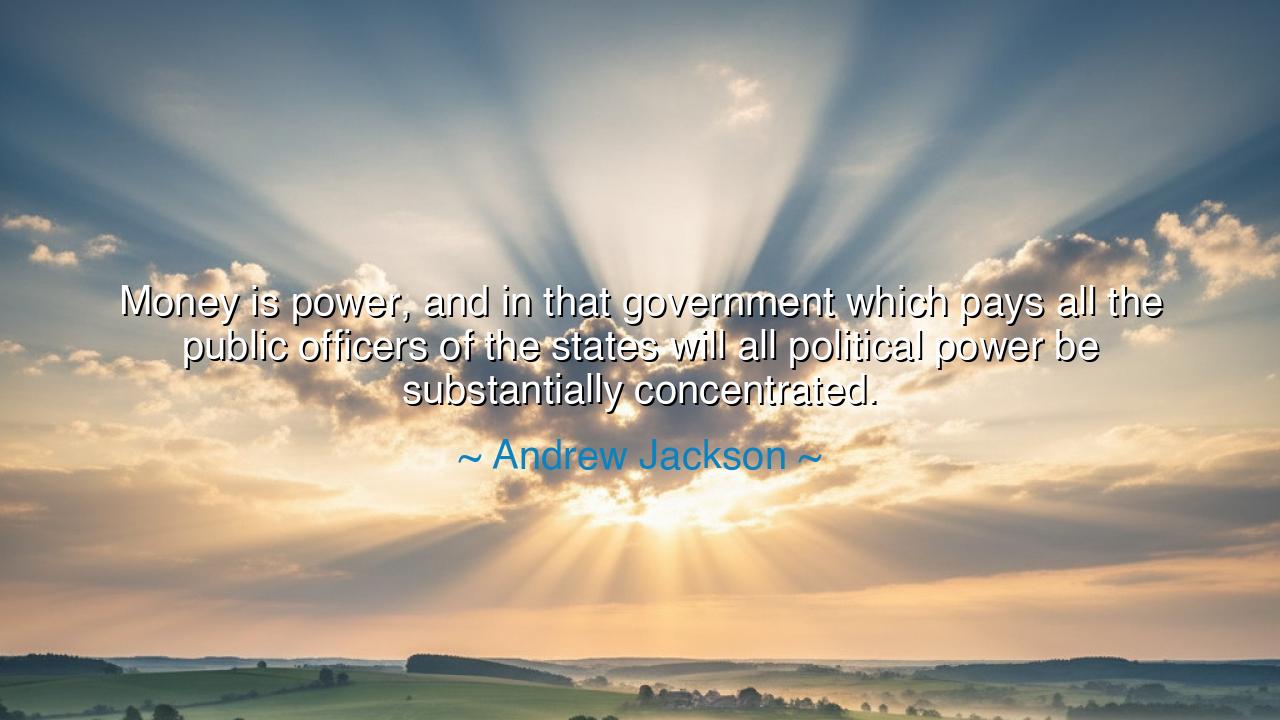
Money is power, and in that government which pays all the public
Money is power, and in that government which pays all the public officers of the states will all political power be substantially concentrated.






"Money is power, and in that government which pays all the public officers of the states will all political power be substantially concentrated." — Andrew Jackson
Hear these words, O inheritors of liberty, and know that they were spoken by Andrew Jackson, the seventh President of the United States — a man of storm and thunder, fierce in will and steadfast in his defense of the common people. When he declared, “Money is power, and in that government which pays all the public officers of the states will all political power be substantially concentrated,” he was not merely reflecting upon coin or wealth, but upon the very lifeblood of freedom — the balance between power and the people. His words rise like a warning bell through time: that when money becomes the instrument by which governments bind all things to themselves, then liberty fades, and the hands of a few come to control the fate of the many.
The meaning of Jackson’s words lies in his deep suspicion of centralized authority and his belief that economic power and political power are inseparable. He saw, even in his own day, that whoever controls the flow of money — whether it be a king, a bank, or a bureaucracy — holds the true scepter of command. If a single government, he warned, were to pay all the officers of the states, then those men, once servants of the people, would become servants of that government instead. Independence would perish in comfort; liberty would drown in the golden flood of salaries and subsidies. It is a truth that remains as relevant in our age as it was in his: when wealth and authority unite, the people become dependent, and dependence is the death of freedom.
The origin of this warning lies in the great battle of Jackson’s life — the struggle against the Bank of the United States, that mighty institution which he believed to be the fortress of privilege and corruption. The Bank held the nation’s wealth and influenced its credit, and thus, in Jackson’s eyes, it threatened the sovereignty of the Republic. “You are a den of vipers and thieves,” he thundered against its directors. “I intend to rout you out, and by the Eternal, I will rout you out!” His war on the Bank was not a mere quarrel of policy, but a war for the soul of democracy itself. He feared that if one entity could control the nation’s money, it would soon control its government — and through government, its people. His victory in that war, though costly and controversial, was a testament to his belief that the concentration of financial power leads always to the concentration of political power.
History confirms this truth again and again. Consider the empires of old — Rome, for instance, whose republic fell when wealth pooled into the hands of the few. As the aristocracy grew rich on conquest and trade, the Senate bent to their will, and the common citizen lost his voice. Bread and games were given to silence the hungry, but real power was gone, bought and sold like grain. Or think of France before its revolution, where the monarch’s court grew fat on gold while the peasants starved. There too, money and power walked hand in hand, until the nation itself broke beneath their weight. Jackson, learned in the history of men and empires, saw that the pattern would repeat wherever vigilance failed — even in the young Republic he led.
His warning, however, was not born of despair, but of fierce love for liberty. Jackson believed that the strength of a nation lies in its people, not in its treasuries or its rulers. He saw government as a necessary servant, not a master. When he spoke of the danger of a government paying “all the public officers of the states,” he was speaking of the slow corruption that comes when dependence replaces duty. He knew that once every official owes his livelihood to a single source of pay, that source becomes the true sovereign. Loyalty to the people fades; loyalty to the paymaster grows. And soon, the machinery of the state turns not for justice, but for preservation of its own power.
Therein lies the lesson that we, the inheritors of democracy, must take to heart. Freedom cannot be sustained where economic independence is lost. A citizen who relies too greatly on the state for livelihood becomes, unknowingly, its servant. A government that controls all wealth controls all will. Thus, the people must forever guard against the slow creeping of centralization — not through rebellion, but through awareness, vigilance, and the preservation of diverse power. Let cities, states, and communities retain their strength; let enterprise remain in many hands. For in diversity of power lies safety, and in concentration lies tyranny.
So, my children of the Republic, remember this truth: money is power, but only when the people surrender that power does it become a weapon. Guard your independence in work, in thought, and in spirit. Do not look to government for every answer, nor fear its fall as if it were divine. A nation’s strength lies not in the gold of its vaults, but in the virtue of its people. When wealth and authority are divided among many hearts, liberty breathes freely. But when they are bound together in the same fist, freedom gasps and fades. Let Jackson’s words be your compass: never allow all power — whether of money or of office — to rest in one hand, for even the gentlest hand will tighten its grip with time.






AAdministratorAdministrator
Welcome, honored guests. Please leave a comment, we will respond soon